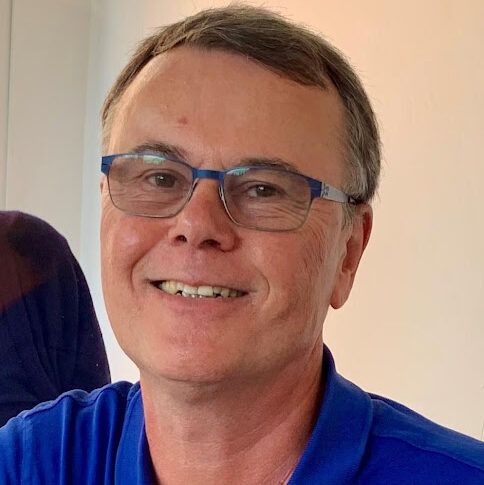Meet Andrew Rankin.
Clinical Development Consultant, Adnovate Clinical, previously Vice President, Global Development Strategy, Regeneron. In this interview, Andrew shares his experiences, the transition from academia to industry, and his insights into the challenges the drug development industry faces in this fast-changing decade.
- Can you give us a brief rundown of your academic background?
I undertook a biology degree in Cardiff, Wales, UK, which included a year working in industry; I was interested in physiology/pharmacology, so I worked my 3rd year in a pharmaceutical lab researching the discovery of anti-inflammatory medicines. While this didn’t convince me that I wanted a career in industry, it did stimulate my research interest and convinced me to pursue post-graduate studies. Upon graduation from my BSc, I spent a further year in Cardiff at the School of Pharmacy in a cardiovascular pharmacology lab which honed my lifelong interest in the cardiovascular system and confirmed my passion for medical research. I was lucky to be accepted into a PhD program in the Dept of Cardiovascular Studies at the University of Leeds, UK, where I studied central and peripheral chemoreceptor control of the cardiovascular system. Good fortune led me to a post-doctoral fellowship at the University of British Columbia, Vancouver, Canada working out the interactions between vasopressin, natriuretic peptides, the cardiovascular system, and kidneys. I spent ten years as an academic in Canada and a wonderful sabbatical year at the Baker Medical Research Institute, Alfred Hospital in Melbourne, Australia.
- What drove you to transition from academia into the pharmaceutical industry? How did you deal with the juxtaposition of those two, at times very different, worlds?
A combination of family drawing me back to the UK and a desire to personally develop beyond the academic world led to my first post-graduate job in the industry at Pfizer in Sandwich, Kent, at the time a 5,000-strong R&D powerhouse that had discovered all of Pfizer’s blockbusters in the 90s and 2000s, including the famous little blue pill. Honestly, it was a difficult transition, moving from running your own research lab, setting your direction, and teaching students, to joining a highly structured, hierarchical organization – the biggest pharmaceutical organization in the world. I worked in drug discovery for a couple of years, where I was more involved in working on translational projects and developing biomarkers and was subsequently offered a role in Experimental Medicine. This was a turning point for me. I fitted much better into the clinical side of the organization than discovery, and my pharmaceutical career flourished. Sometimes, you just have to take a leap and a risk, and for me this leap led to roles designing protocols and running clinical trials, and ultimately to leadership of the entire drug development programs from first-in-human studies to market authorization and making new drugs available to patients.
- Can you tell us about some of the interesting projects/approvals you have been involved with: what made them special?
Well, I’ve been lucky, no doubt about that; many people go through their pharmaceutical careers without touching a medicine that gets to help the people who need it. I was fortunate to work with and learn from amazing people; not only smart medical scientists, but also those passionate to make a difference to the patients that need better treatments, and often have no real effective options at all.
One that stands out at Pfizer was leading the early clinical development of sildenafil for a very high medical need condition at the time, pulmonary arterial hypertension. This involved working with academics who had found amazing results through crushing up Viagra pills and giving to infants with life-threatening cardio-pulmonary conditions awaiting surgery. The clinical members of the team were passionate and amazing, and we were all determined, in the face of colleagues in the organization with reservations about putting the recent success of Viagra at risk in such a life-threatening indication. We lobbied senior Pfizer personnel and commercial colleagues with the data and medical need and the concept was ultimately embraced by all, and now Revatio is available to patients around the world. Sometimes science is not enough, it takes passion, determination, and an amazing team of multi-talented cross-functional colleagues. Special people can change patients’ lives.
This experience exposed me to rare diseases, and I’ve since developed a number of new medicines to treat some very rare but devastating conditions at both Alexion and Regeneron. This led me to get more involved with patient advocacy organizations and many special people living with rare diseases.
- Have you in the past incorporated your influence and awareness to contribute to Charity patronage and if so, in what and why?
My professional experience in developing therapies for people living with rare diseases has had a great influence on me. The patients and families who live with rare diseases show immense resilience, creativity, and energy in not only forming effective organizations to lobby for research and government support, but also in giving practical and emotional support through what is often a long and crooked road to getting a diagnosis and medical help. I have been humbled by working with such groups around the world and made friends from Moscow to Melbourne and Milano.
As chance would have it, I also became personally involved with a family to whom a child was born with an ultra-rare and devastating genetic disease; this gave me the opportunity to apply my experience as a Board Member on the KAT6 Foundation, identifying and working with academic researchers as we strive to unravel the complex impact of this mutation and work towards effective therapies.
- What positive changes have you seen during your time in industry?
The technological advances have been mind-blowing, both in terms of the genetic revolution and resulting new modalities such as siRNA and gene therapy, and the explosion of biologicals such as enzymes and monoclonal antibodies: these advances have led to the global approval of multiple effective therapies across diverse indications. The creativity in clinical trial design, working with regulatory agencies (from developing and incorporating biomarkers to adaptive and Bayesian design to enable more efficient and rapid decision-making) has been important, and of course the focus on personalized medicine. Additionally, when I started this journey, there were mainly large corporations or amalgamations of smaller ones that became larger pharmaceutical companies. The proliferation of start-ups and academic spinouts has exponentially increased the variety and number of drug development targets and potential new medicines in the last 25 years. The major academic hubs such as Oxford, San Francisco and Boston/Cambridge have been a raging crucible of invention and innovation. To fuel this, the massive expansion of private equity funds, angel investors and many other types of financial investors has also transformed the landscape. I see this as very positive in innovation, increasing the diversity of platforms for developing new medicines and creating many more options for patients, including those living with rare diseases, than were around 25 years ago.
- What do you think are the 3 largest challenges facing the pharmaceutical industry in the next decade?
Whilst I am a passionate advocate for developing therapies for people living with rare diseases, the pricing of medicines for what might be only hundreds or a few thousand patients is a dilemma for healthcare systems with struggling budgets and many more thousands of patients suffer endemic conditions with poor treatment options.
Secondly, and linked to this, is the changing focus of pharma and biotech to smaller disease populations that can be targeted through the genetic revolution and executed with small, focused clinical trials. This has led to underserving endemic conditions such as cardiovascular disease and more common infectious diseases, where we are seeing increasing resistance to antibiotics. Regulatory agencies set a high bar for new therapies to treat large, endemic diseases such as diabetes, demanding outcomes studies that often involve tens of thousands of patients and place a great burden on sponsors, with low probability of a successful outcome. We must find ways to encourage companies to continue to invest in these common endemic diseases, in addition to rarer conditions, and somehow design trials that cost only a fraction of the $billion price tag some have cost in recent years. Learning from the Covid19 experience should be built upon, but regulators also need to be part of the solution.
Thirdly, I would say including patients in clinical trials beyond the tried and trusted countries and wealthier global regions is both scientifically and ethically important. However, inclusion is a challenge unless we can get past the paradigm of only running clinical trials in jurisdictions with commercial opportunity.
- And as a follow-on question, how do you think the industry will change in the coming decade?
Restrictions on pricing are potentially going to have a massive impact. Starting in 2026, the US Inflation Reduction Act (IRA) will authorize the Department of Health & Human Services to negotiate prices for certain expensive prescription drugs within the Medicare program. It has been suggested that the IRA will result in reduced innovation and a 20-30 percent per year drop in drug approvals. The development of both large and small molecules is affected and it is also likely that follow-on indication investments will be deprioritized with a shortened period before pricing restrictions apply. Since the IRA will apply first to small molecules, the earliest impact could be a reduction in the development of oncology drugs, which have mainly utilized small molecule technology. How healthcare systems deal with the pricing of personalized medicines (and yes, rare diseases), will become an increasing focus in the world of tighter budgets; entirely new paradigms of healthcare economics may need to be developed to respond to the evolving economic and healthcare environment.
- What do you think companies like Adnovate Clinical offer that is unique in the changing pharmaceutical development environment?
Whilst not an exclusive focus, many of Adnovate Clinical’s clients are small biotechs, start-ups and spin-outs in the early clinical stages or pre-IND, who have very limited budgets. From the experience of the Founder and Board Members, Adnovate completely understands the differing financial needs of small biotechs and provides timely, flexible support and a costing model that may be adapted to investment milestones; we will propose cost-effective operational strategies with appropriate vendor selection and partner to provide oversight with a flexible, hands-on approach requiring minimal effort for the client.
Adnovate Clinical comprises seasoned industry professionals with MDs, PhDs or both and significant experience developing and executing clinical development and regulatory strategies, in small start-ups and larger biotech/pharma companies. We have a comprehensive understanding of evolving risks throughout the clinical development life cycle, the pressures from within to drive to decision-making inflection points (particularly in a financially constrained environment) and where such critical data will drive further investment.
Adnovate Clinical teams bring cross-functional expertise across a broad range of therapeutic areas, encompassing orphan rare disease and more common, highly prevalent indications across multiple modalities, including small molecules, biologics, gene and cell therapies, plus combinational devices and therapeutic platforms. Adnovate Clinical team members are experienced in bringing new therapies from pre-clinical to first-in-human studies through to global market authorization, facing many challenges and working with regulatory agencies to find effective solutions.
In summary, not only does Adnovate Clinical have a deep understanding of how to efficiently and successfully navigate the drug development process, we understand the multiple pressures and constraints that clients may face in a fast-paced and resource-constrained environment. Adnovate Clinical develops a custom-made approach for each client to meet specific and individual needs.
;)

